This post may contain affiliate links. Please read our disclosure policy.
I’m partnering with Pearson and Connections Academy® for today’s post, but all views are my own.
Did you know that more than two-thirds of parents are concerned their children may fall behind academically due to school closures? According to a study conducted by Pearson & Connections Academy®, in partnership with Dynata, which looked into education during the pandemic, these concerns are growing. They are even higher now, at 69%, than they were in March, at 64%.
As a former teacher, I understand this concern because children lose an average of TWO TO THREE MONTHS of learning during the summer months. I saw this to be true in my classroom each new school year. Imagine the learning loss this year, with the summer months PLUS the months where the schools were closed due to the COVID-19 outbreak.
This year is going to be far worse for children in traditional schools, due to the school closures that occurred in early spring. It’s no wonder that as schools closed, parents of school-age children were grappling with a lot of emotion. They were faced with the lingering worry that their kids may fall behind, and that worry has only increased as time has gone on.
Parents are wondering how children can maintain academic, social, mental, and emotional well-being during this long-lasting transition. They are even losing confidence in their child’s education, as this statistic proves: “Nearly 50% of parents are not confident in their school’s ability to offer a quality academic experience or help prep for college/the future during the COVID-19 outbreak.”
I want to tell you that you DO have a solution. I’d like to give you options to help you help your child.
Summer Break Can Be Just What Your Child Needs To Catch Up On Education
I’ve always used summer-break as a way to educate our kids in non-conventional ways. When I was a junior in college, I learned about the Summer Slide. I learned how severe it could be if parents and teachers did not step in. I was determined not to let my children fall into that statistic.
Children can lose 2-3 months of learning during the summer months. Summer learning loss builds up over time, turning those 2-3 months into an achievement gap of two or three years behind their peers. – EducationNext.org
This year makes it even more true. I want our kids to go back to school ready to learn, without struggling to “catch up” from this pandemic or from the summer. Instead of being confused about the new math problem that they will learn, they will be eager to tackle it.
Instead of trying to move up to the book level that they LEFT on (most kids drop a few book levels over the summer), I want them to go back ahead of where they ended last year.
Even when I was not worried about our kids falling behind because of school closures, I still worked with them in the summer.
Why it works:
Our “Summer Homeschool” schedule may not be similar to what traditional school looks like during the school year, but it is similar to what a homeschooling schedule may look like during the school year.
Here is why it works for us (and could possibly work for you, too)
- Our kids love it because we do it as a family, and we make it fun. They like our time together, and so do I. Each morning, we spend a few hours on schoolwork, and every evening, we spend time playing together. Our children said this is their favorite summer, even though I’ve increased their homework and increased their chore load.
We, as parents, don’t find it to be stressful. It’s quite the opposite. It gives us a sense of routine. Plus, unlike “school at home,” we aren’t worried about following the specific rules/guidelines/schedule for each teacher. I know that when we were doing “school at home” during the school-closure months, it was hard to keep up with the different teachers’ different requirements for video platforms, submitting homework, etc…
That was stressful at times… this is not.
Since the “stay-at-home” months is in addition to the normal summer slide that most students experience, this year will be more important than ever to keep up best-practices at home.
Our Summer “School” Schedule:
I’d like to share our summer schedule. It works well for us, and we have used a similar plan every summer, tweaking it a bit as they grow.
Throughout the week (M-F), our four children spend about 1-2 hours doing ‘school’ work. This is on top of their daily chores, which are also expected to be completed each day. Remember that means that in a 24-hour day, I’m only asking for 1-2 hours a day to help them learn and grow. It is just a tiny slice out of their summer fun, and they will benefit immensely.
Here is an example of a typical day’s work:
We start school in the late morning because two of our kids like to get their chores done early in the morning so that when we finish school, they are done for the day. Our other two kids would rather spend the morning sleeping in and then doing their chores after we finish our school work. To each their own. 😉
- TYPING: 10-20 minutes a day on Typing Club – This can be done individually.
. - READING: 20 minutes a day (minimum) reading – After dinner, we spend 20 minutes reading. Some of us go on the front porch, and some go on the back porch, some of us stay in the living room or kitchen. I set a timer for about 25 minutes, and we read until the timer goes off.
REMEMBER… Studies have proven that reading for more than 20 minutes a day scored 90% better than their peers on reading tests. It exposes them to 1.8 million words a year, compared to those who read less than 5 minutes a day and are only exposed to 282,000 words per year. When kids read 1 minute a day, they are only exposed to 8,000 words a year. That’s a HUGE difference.
My goal is that my children will always enjoy reading. It is hard to enjoy something when you find that you are always struggling at it.
- BIBLE: Complete the “Daily Quest” on their Superbook App – This can be done individually, but I prefer to do this as a family so we can discuss it.
- GRAMMAR: 10 minutes a day on grammar. This is usually done with a lesson that I’ve taught, a worksheet I’ve created, a YouTube Grammar video that we all watch together, or I’ll have them spend time online on a website with grammar games.
- WRITING: 15 minutes a day writing in their journals. This is right after the grammar lesson because I typically ask them to use what they’ve learned in their writing. I’ll usually give them a prompt, too, like “There was a man who walked into a room and realized that he had traveled back to the 1800s. What happened next?”
- MATH: 10-20 Minutes of Math. You can use an app, give them a worksheet, use flashcards, play a math board game (I have several), or use sidewalk chalk outside to explain and practice math concepts. You could have your kids swim while you time them and then have them try to beat that time. Find the difference. Then, take it further and multiply that number to see how long it will take you to do it four times. Make an educated guess and then test that theory!
- GEOGRAPHY: 10 minutes a day on one state & the capital. Each day we pick one state & capital to focus on. We try to find one interesting fact about that state, we watch one video about it on YouTube about it (this can take longer than 10 minutes), and we find it on the globe.
- NOTE: Each WEEK, we focus on a different country. We spend the entire week learning about that country. We usually do this at night, usually before bed. We watch a YouTube video that was taken in that country and we plan a few meals to make that are based on what they eat in that country.
- SCIENCE: Science is worked into whatever we do during the day. While we are baking, crafting, looking at clouds, playing in the rain, or finding fun experiments to try, we are using science. I felt like we were using science all day, every day, so I didn’t add it to our morning schedule.
- KINDNESS: Last, but not least… my favorite activity: Spend 5 minutes a day writing in a sibling’s journal. We rotate daily, but the concept is that every day, they have to write 1-3 sentences about that person.
- Example: Jack might write in Beau’s journal: “Thank you for riding bikes with me yesterday! It was great to tackle those ramps together.” or Ethan might write in Allie’s journal: “You did a great job riding your bike up that hill yesterday. I was glad that you came with us!”
After this, we all eat lunch, and the kids have free-time, within reason, until dinner-time.
Every evening, after dinner, our family has “family time,” which is just time spent playing together. It’s become everyone’s favorite time of the day.
We might play four-square or kickball outside, go on the swings, play jacks inside, jump rope in the driveway, go on a bike ride, go on a walk, swim in the pool, go boating, or play a board game. The only thing that we don’t do is electronics (movies, tablets, etc… aren’t used during this time). We typically spend about two hours at night on these activities.
Other Summer Education Options (if you don’t want to lead the lessons)
If you are worried about teaching your child (whether it be due to lack of teaching experience or a lack of time), I want to encourage you to look into other options. There are so many summer schooling options that could work for your family.
You can find online summer-school options, like International Connections Academy. This summer-school program is great because it uses state-of-the-art education technology to offer summer courses online.
Your kids can take a class at the beach, on the road, or at home. It’s flexible so your child can still enjoy vacation or work a summer job without rearranging their lives to fit in that class. While this Summer School does come with a fee, as opposed to Connections Academy’s free full-time online public schools, it is still affordable.
Online summer school is a great way to continue your child’s learning. International Connections Academy is a great option if you’re looking for an accredited summer school for credit or enrichment. They offer programs for all grades and even programs for those looking for ways to prepare for life after high school. Plus, in this made-for-online program, parents are more like a coach and mentor than the teacher.
If you are looking for alternative schooling options for the upcoming school year, this is a great way to transition from traditional school to Online Learning. There are tuition-free, public k-12 online schools, like Connections Academy, an accredited school supported by Pearson that offer core courses in Math, Science, Language Arts, and Social Studies for all grade levels. They also offer Physical education, math, and music as part of their comprehensive curriculum.
The Freedom of Summer Doesn’t Have to Mean Loss Of Education
As Connections Academy says, “Even the most dedicated students look forward to the ‘no more pencils, no more books’ freedom of summer. But the break from study can weaken important skills. Fortunately, with summer school courses from International Connections Academy, a fully-accredited, tuition-based online school for grades K–12, students can avoid losing what they’ve learned while still enjoying family, friends, and vacation!”
Summer is fun, but it is not a “get out of jail free” card. It is a chance for us to learn together, grow together, have fun together. It is a chance to help your child in their academic career, but to also help your child bond with you.
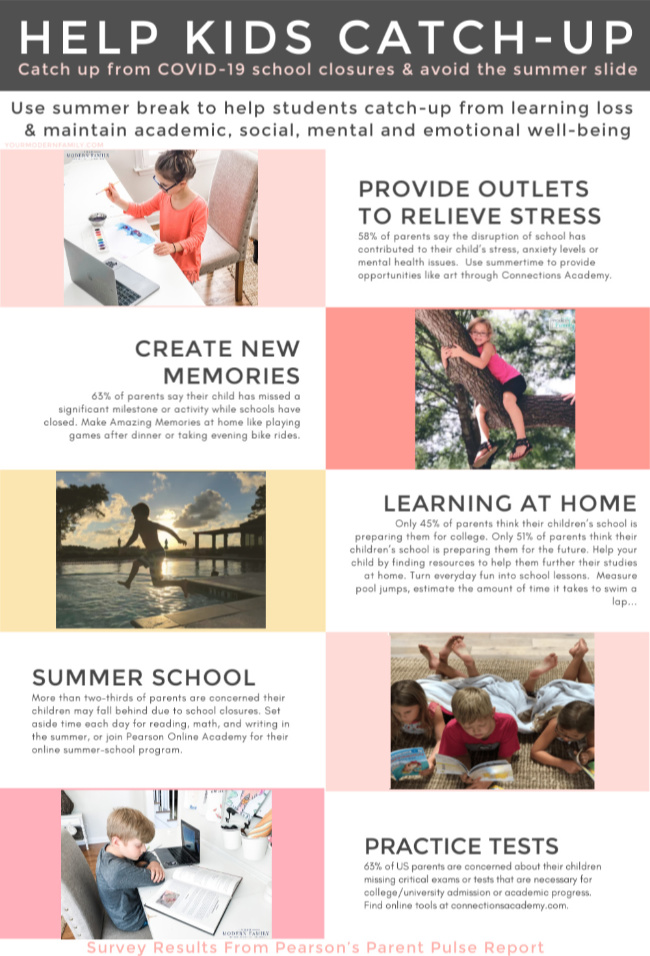
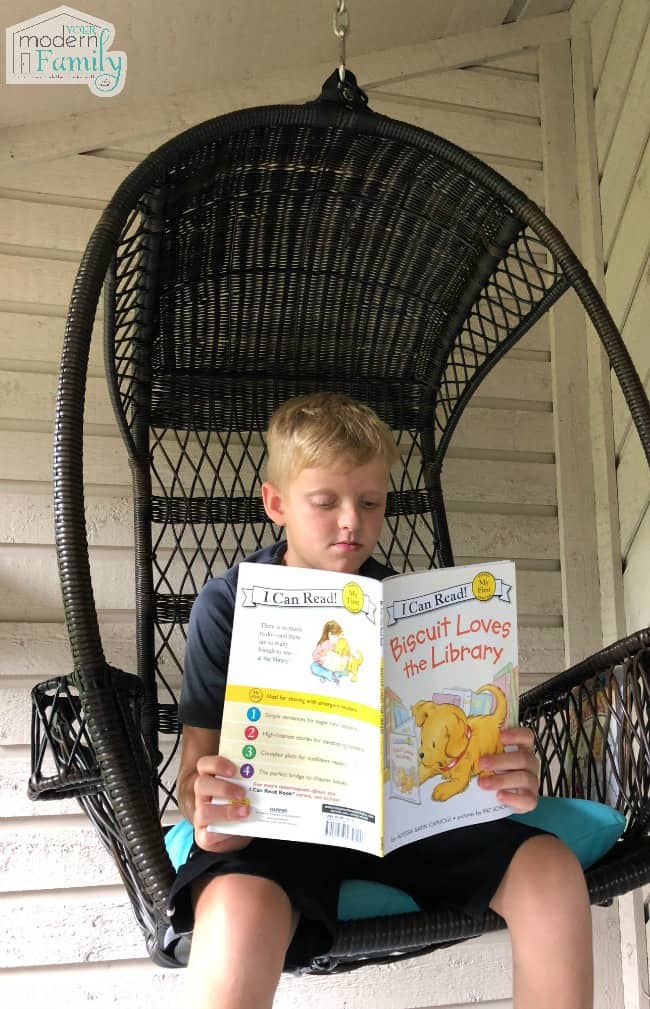
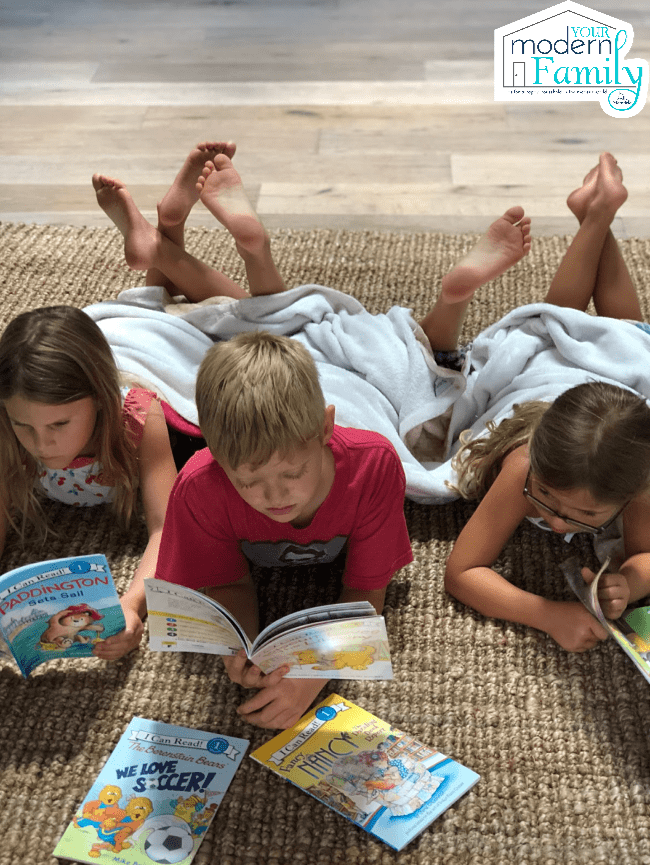
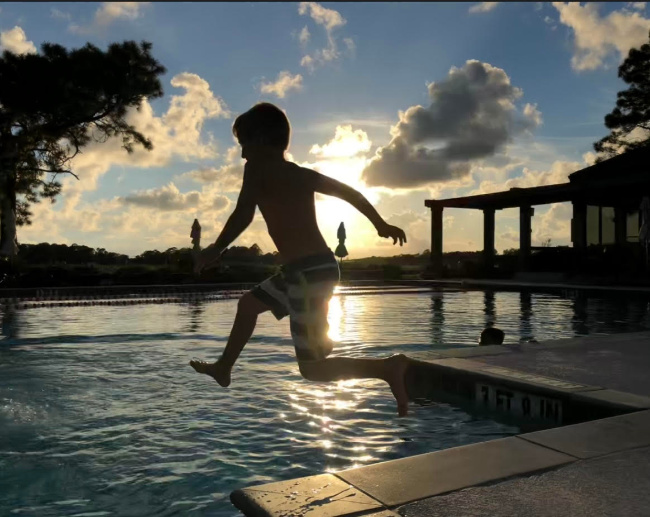
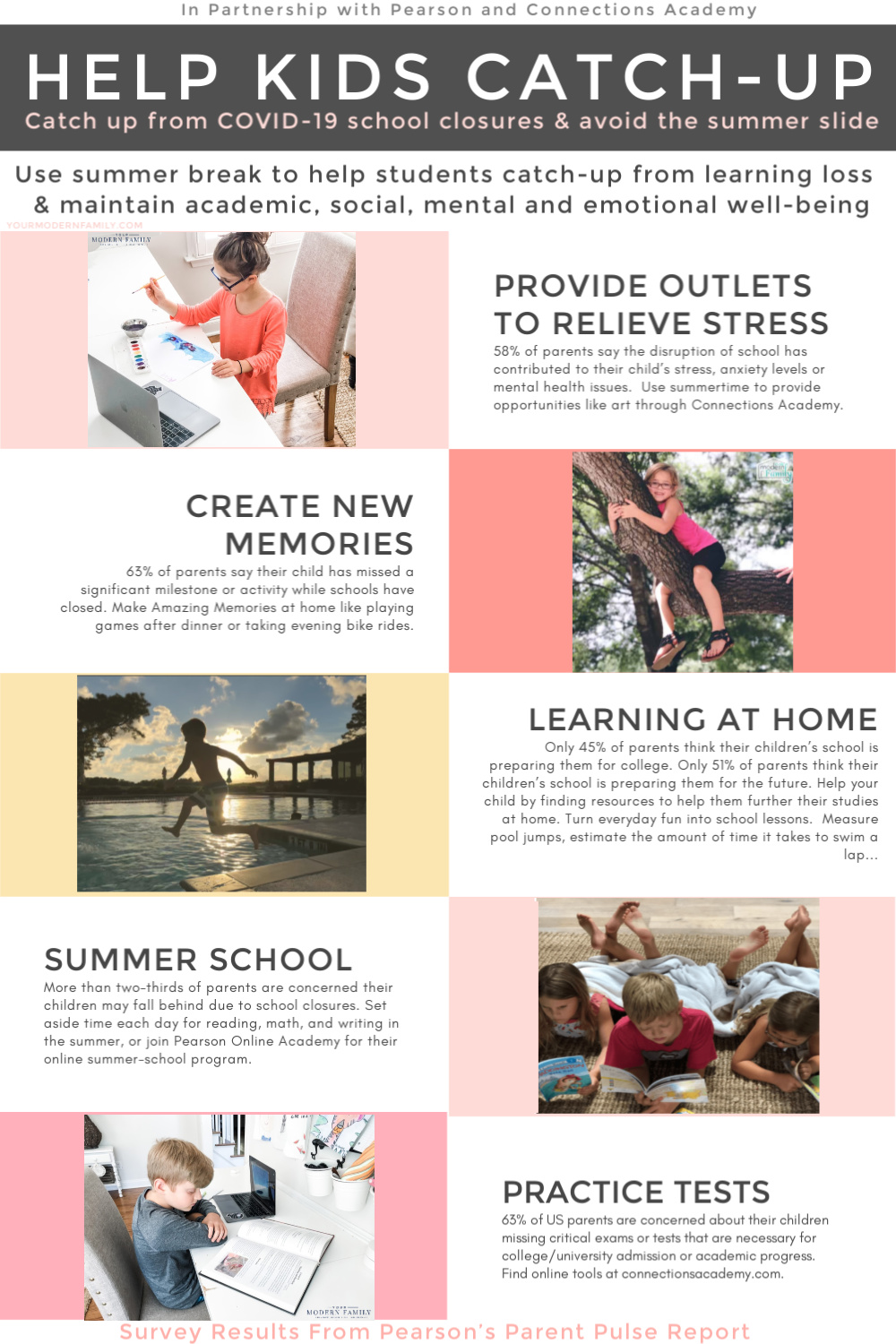














Yes, it is always a good idea to prevent summer learning loss and this year it is a good idea to make up for any missed education. Great point that there is plenty of time while having summer fun to squeeze in a bit of learning too!
I enjoyed reading your article and the suggestions and times for subjects/areas of life you wrote about seem very easy to implement. My only suggestion is to include helpful tips, activities, etc for families that don’t have children close in age like you do. My munchkins are 13, 5 and 2, he just turned two! I’m also a SAHM who quit or paused as I like to say, my nursing career and I homeschool as well. Thanks!